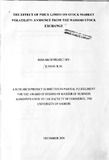| dc.description.abstract | This study empirically examines the effects of price limits on stock market volatility at
the Nairobi Stock Exchange (NSE). The study's data set is comprised of a series of daily
market indices and weekly returns of the market for the period between 1986 to 2003.
Whereby, from this period two sub-periods were identified: 1986 to 1990 being the prelimit
period, and from 1991 to 2003 being the post-limit period. Given that equity stock
price limits were introduced in Kenya in the year 1991. These limits were set at 10% up
or down of the closing prices of each equity stock as recorded in the most recent trading
session ended. Their main objective is to reduce the volatility of equity stock prices, a
characteristic of a majority of emerging stock markets in the world.
The research findings display positive skewness, excess kurtosis and deviation from
normality in the return distributions; an effect of the heteroscedastic nature of stock
returns distribution. The returns also show significant serial independence, implying
stock market efficiency. Moreover, the results show a significant relationship between
conditional volatility and stock market returns. The risk-return parameter is positive,
consistent with the portfolio theory where investors arc compensated for additional risks
assumed in an investment. Most importantly however, the daily price limits did have a
marginal impact on stock price volatility, as the findings indicate a marginal decrease 1.'1
volatility resulting from the uniform imposition of daily price limits on all equity
securities at the NSE. These results therefore, convey strong support for the overreaction
hypothesis, which advocates the tendency of investors to overreact to new information.
The advent of price limits then gives them time to re-assess this new information
resulting in a reduction of stock price volatility. | en |

